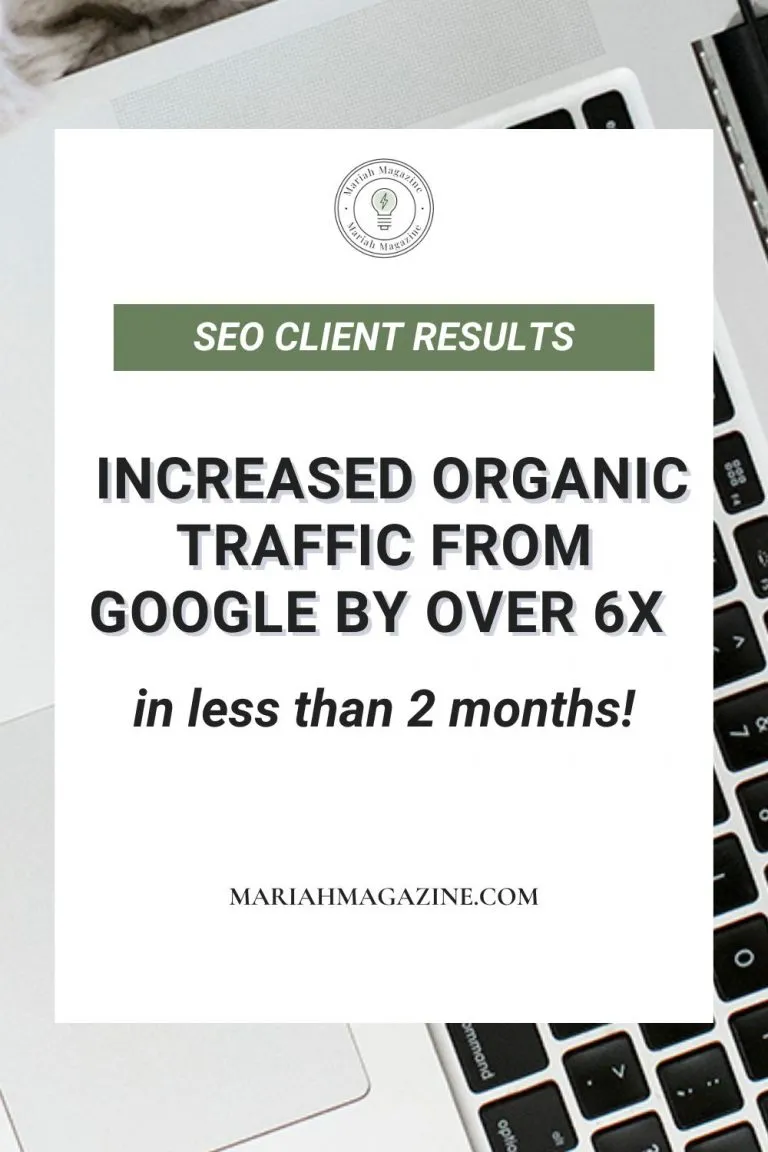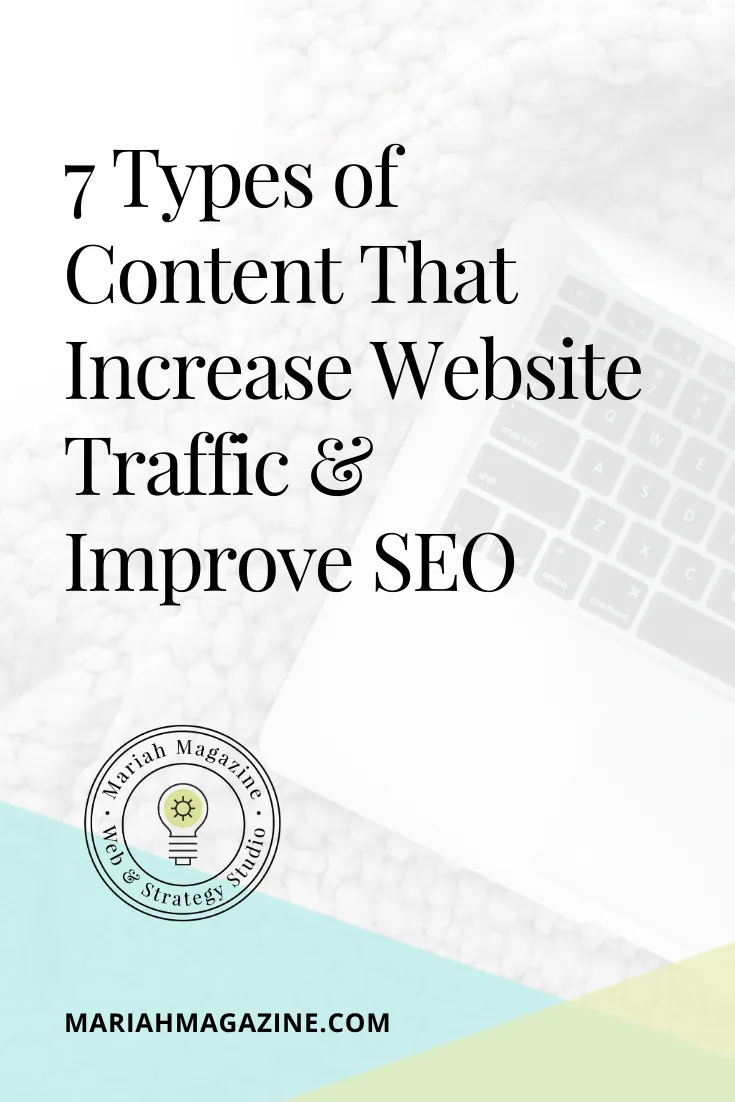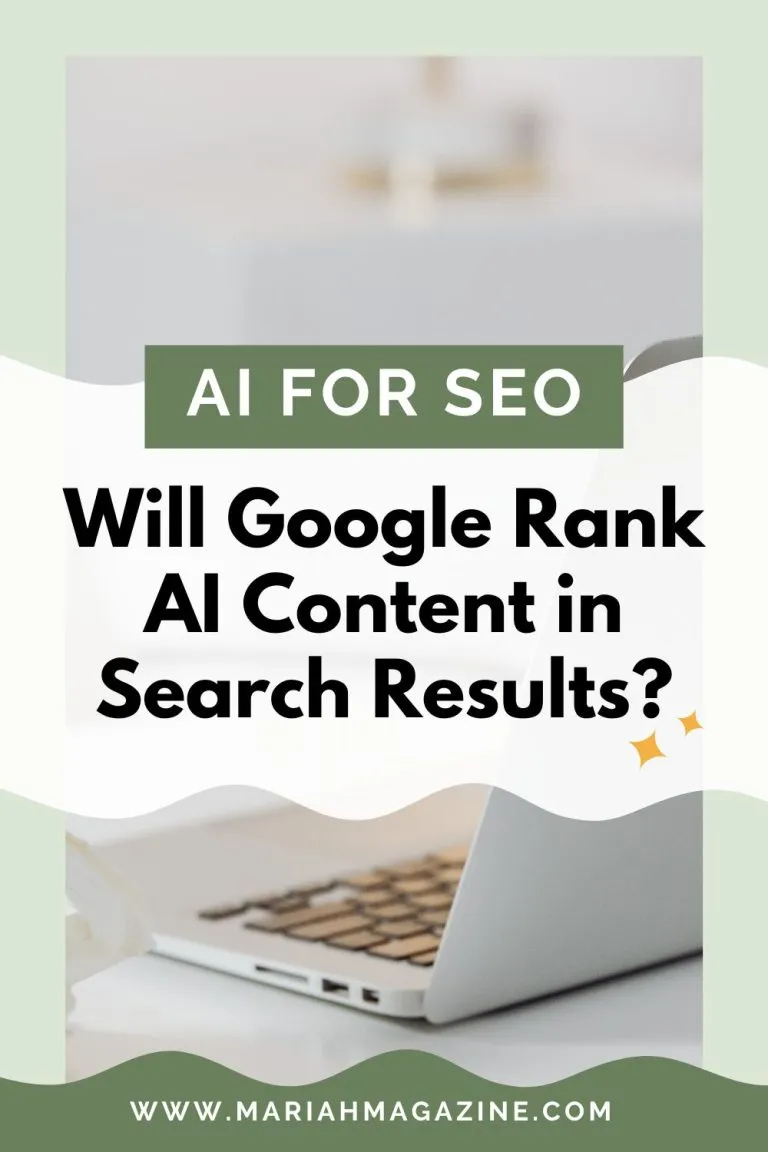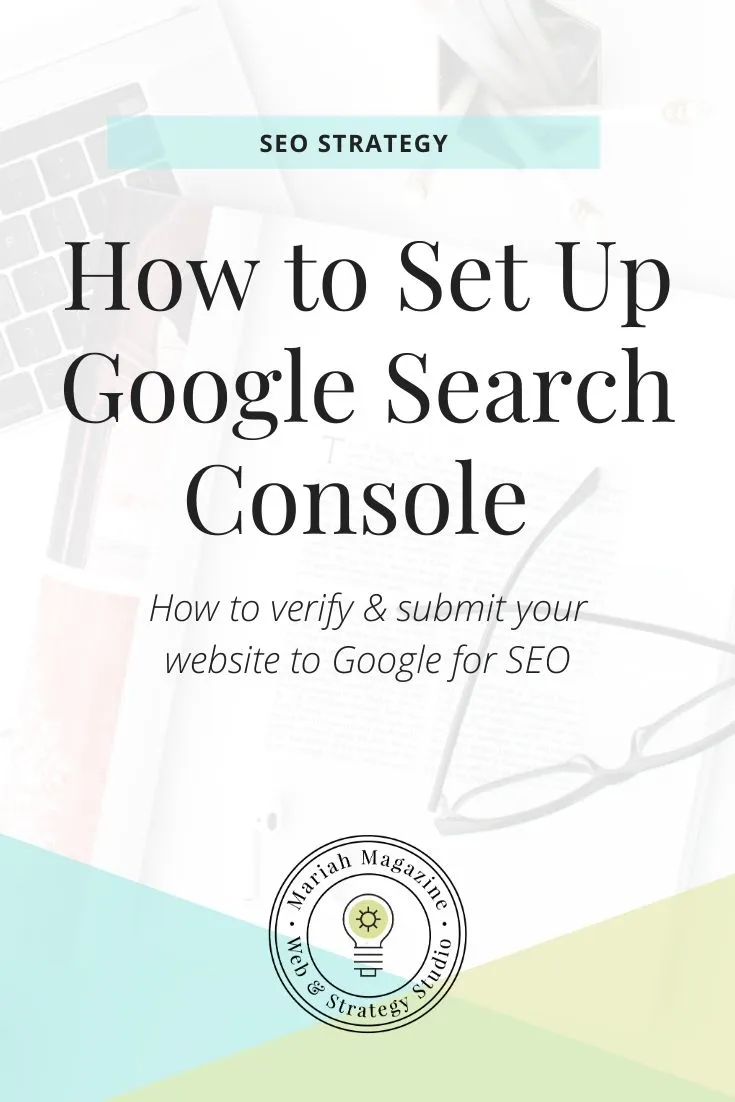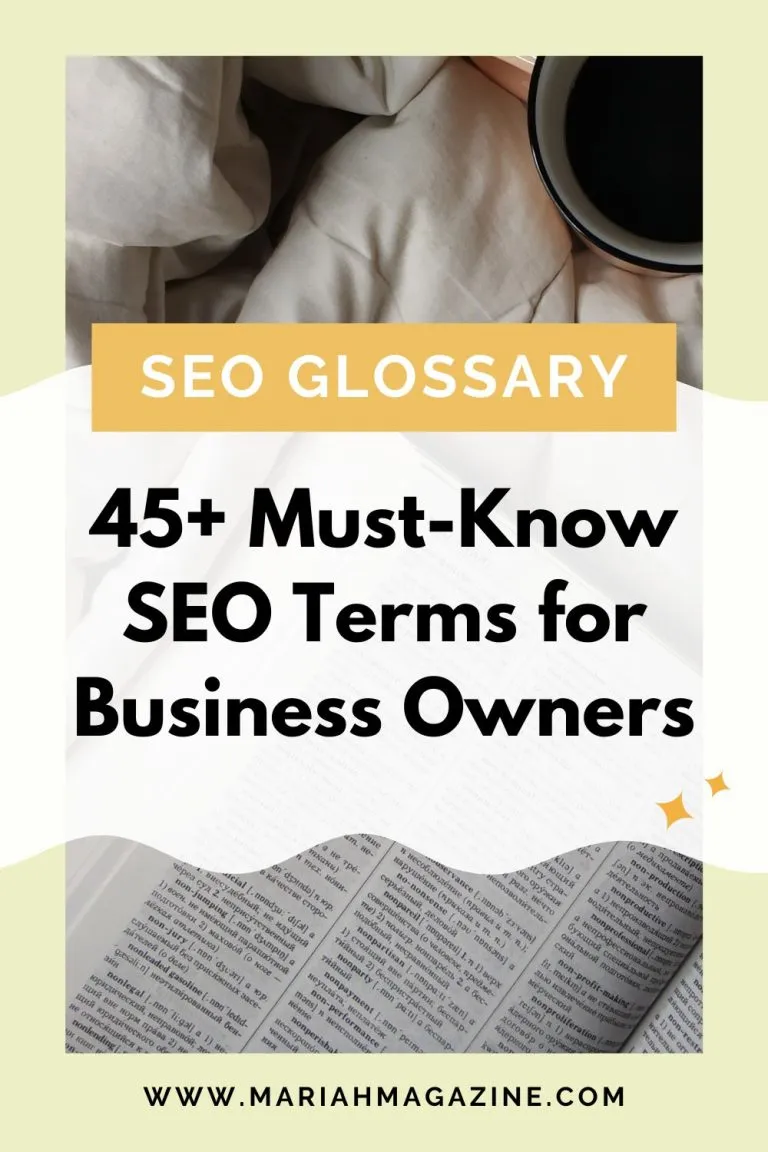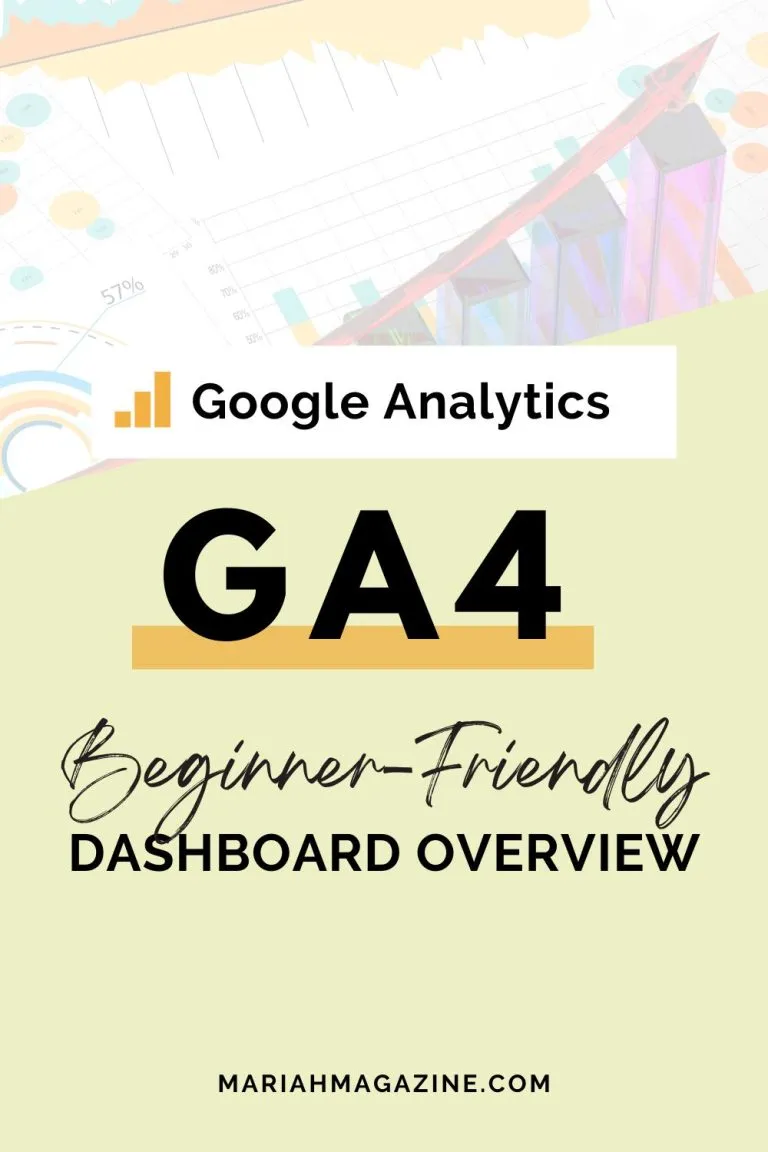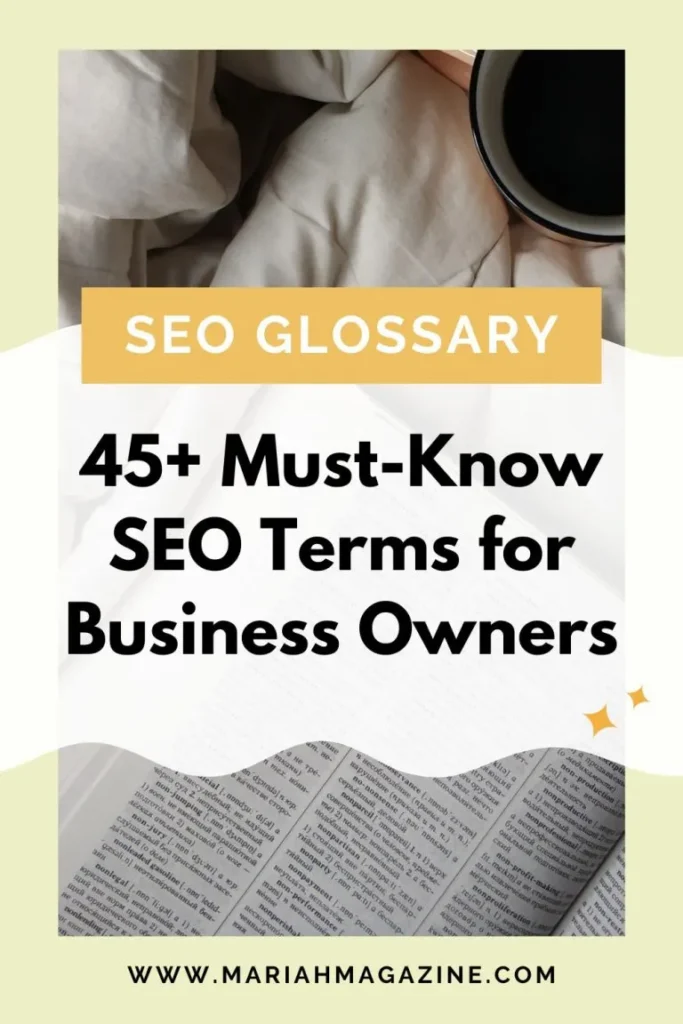Recent Post
Categories

Let's get
As the world gets more automated and futuristic, creators & business owners have started to experiment with artificial intelligence (AI) to generate content.
But, what does Google think about AI for SEO?
Does it love it?
Does it hate it?
Does Google rank AI content?!
“BREAK IT DOWN FOR US, MARIAH!”
Okay, okay, that’s exactly what I’ll do.
But first, a quick note: There are affiliate links within this blog post. What that means is that if you purchase anything or sign up for anything after clicking on a link in this post, I might make a small commission, at no cost to you. Affiliate links are one way I keep this blog & business alive & kickin’ 😉 – BUT I would never suggest things that I wouldn’t use myself!
Google’s Initial Thoughts on AI for SEO
So let’s kick this one off with Google’s INITAL thoughts on AI-generated content when it started taking the internet world by storm.
Back in April 2022 during this SEO Office Hour, John Mueller (a head search analyst at Google) was quoted saying “Automatically generated content is still against the Google Webmaster Guidelines” aka, if you DO create content using AI, Google will see it as low quality, likely manipulative, and more spammy, which could result in a penalty.
So in short, it was a no-go for Google.
And people freaked. The. Fuck. Out. LOL
There was a follow-up question of something along the lines of:
“Okay cool, so Google can detect content written by machine learning tools or AI?”
To which Mueller replied: “I can’t claim that.”
Making it prettttty clear that Google cannot detect AI-generated content automatically.
So it got pretty sticky lol
But that was back in 2022, since then, what’s the scoop? Does Google still feel the same way about AI content?
In short, no.
Hell, they even responded back (after the explosion of interest in ChatGPT) by creating their own AI tool called Bard. AND they consider themselves an AI-first company. (They use hundreds of machine learning models in various products – search, Ads, YouTube, Gmail, etc)
So they can’t hate on AI too much 😉
Since the initial April 2022 statement by John Mueller, Google has clarified its stance on AI-generated content and has given us some extra CONTEXT around it to clear this up a bit.
I think the entire scenario was a beautiful invitation for the Google people to get together and actually create some AI-specific guidelines when it comes to content creation and how Google is going to handle it going forward…
Because AI ain’t goin’ nowhere, ya know?
So what’s the focus when it comes to AI for SEO?
In order to have your content rank on Google, whether it was created by a human or AI, it should be original, high-quality content, USER-focused content.
Aka, if your content doesn’t help your audience or the people searching for it on Google, it’s unlikely going to rank.
Regardless of how that content was created.
Because think about it, Google is a business.
If its users don’t like the search results and thinks Google is recommending shitty unhelpful options or bad results that don’t match what they searched for, people will stop using Google and shift towards other search engines, with Google obviously does not want.
In Google’s search guidelines, they say
“Google’s ranking systems aim to reward original, high-quality content that demonstrates qualities of what we call E-E-A-T: expertise, experience, authoritativeness, and trustworthiness. Our focus on the quality of content, rather than how content is produced, is a useful guide that has helped us deliver reliable, high-quality results to users for years.”
And to be honest, this is NOTHING NEW.
There are over 6+ MILLION blog posts published a day (according to Zippia).
And that’s kinda the whole hold-up with AI.
AI seems to make generating run-of-the-mill content pretty “easy”, so Google (and the rest of us lol) were afraid that there would just be more shitty content produced.
And we don’t need “more content”, we need BETTER content.
Which is what a lot of websites have trouble creating in the first place; better content.
Especially when the website’s primary goal for creating content in the first place, is to rank on Google.
Most websites want the gold, without having to take the time to dig.
They want the results, without putting in the work.
They want the quick wins by just regurgitating the same shit that everyone else is saying, without adding their own perspective, flavor, tone, and experience.
They want page #1 by ONLY focusing on keywords and optimization, without any thought into the content itself, AND THAT, is what Google wants people to understand about using AI for SEO & generating content…
Using AI to create mediocre or the same old content, isn’t going to do shit for your SEO or organic search rankings.
Good, high-quality content, TAKES TIME to create, regardless if you’re using AI or not.
And this isn’t Google’s first rodeo with this type of thing; AI just adds a new layer.
Having people try to create content just to manipulate search rankings is nothing new for Google. (Go ahead and look up “content spinning” – it’s been a thing for a LONG time)
And because of that, the algorithm has had to have things in place to detect spam content or manipulative content, which IS in fact against their policies.
Google states:
“When it comes to automatically generated content, our guidance has been consistent for years. Using automation- including AI – to generate content with the primary purpose of manipulating ranking in search results is a violation of our spam policies. This said, it’s important to recognize that not all use of automation, including AI generation, is spam. Automation has long been used to generate helpful content, such as sports scores, weather forecasts, and transcripts. AI has the ability to power new levels of expression and creativity, and to serve as a critical tool to help people create great content for the web.”
So in short, pumping out a bunch of junk content from ChatGPT, SEO-optimized or not, is not gonna do shit for your SEO, your rankings, and even arguably most importantly, your conversions.
BUT, if you’re using ChatGPT and other AI tools to help you create useful, valuable, thoughtful content, well, then that’s a different, and likely more promising, story.
Can AI Generated Content Show Up on Google?
According to Google, AI-generated content CAN be ranked in Search, even on page #1, as long as it’s not spammy garbage.
What is considered Spammy auto-generated content? (aka “Spammy garbage)
Spammy automatically generated (or “auto-generated”) content is content that’s been generated programmatically without producing anything original or adding sufficient value; instead, it’s been generated for the primary purpose of manipulating search rankings and not helping users.
EXAMPLES OF BAD AUTO-GENERATED CONTENT INCLUDE:
- Content that has a bunch of random words that don’t make sense, but include words that people might search for.
- Content that has been translated from another language using a computer program, without anyone checking to make sure it makes sense.
- Content that is created by a computer program without anyone making sure it’s good quality or helpful to you.
- Content that has been created by a computer program that takes existing content and changes some of the words to make it seem different.
- Content that has been copied from other websites or search results.
- Content that takes a bunch of different pieces of content from different websites and puts them together, but doesn’t really add anything new or helpful.
Google outlines all of its spam policies and guidelines on its website, but I had ChatGPT rewrite the bullet points under the “Spammy automatically-generated content” heading so it was easier to understand 😉
Does using AI for SEO & content creation have any special advantages for ranking?
Content is content, regardless of how it was created. It depends more on the CONTEXT of the content.
- Is it useful, helpful, or original? (from the USER perspective)
- Does it satisfy aspects of E-E-A-T? (are you showcasing your expertise & experience? Is your website trustworthy? etc)
- Are you targeting the RIGHT SEO keyword? (most people think they are, but they aren’t. Especially my DIY SEO humans)
- Is your content SCANNABLE? Is it easy to read & sift through, formatting-wise?
- Are you OPTIMIZING the piece of content well? (It could be an amazing post, but if the Google bots are confused on what the hell you’re talking about or targeting, it could still flop.)
If you answered yes to those, then it might do well in Search & end up ranking well.
If it doesn’t hit those nails on the head, it might not.
Worried that AI content might start to outrank YOU in search results?
This is suchhhhh a great topic to explore.
I was having a conversation with a blogger the other day and her fear was that a new blog could essentially launch and start ranking quickly with AI-generated content & push her out of page 1, even though she’s been blogging for 10 years, and been on page #1 for specific keywords for that amount of time too.
I understand that fear.
And hypothetically, it’s absolutely possible for a piece of content generated mostly by AI to outrank you.
Just as it’s likely that another blogger could outrank you.
But we HAVE to remember that Google judges a page on over 200+ factors in order to determine it’s ranking.
And A LOT of these ranking factors have to do with the authority & expertise of a website/blog/domain name.
AUTHORITY & EXPERTISE MEAN THINGS LIKE:
- Backlinks
- Amount of time the domain has been around
- How long do users spend on your site?
- Overall brand/blog trustworthiness
- Reviews
- Topic authority
- etc etc.
Because of that, another blog post, regardless if it’s created by another blogger or by AI, is unlikely to outrank you overnight.
But this is why it’s important to keep track of your rankings too.
Because it’s 1000000x easier to keep a page or post ranking at the top of page #1, BEFORE it starts slipping too hard.
But I wanted to bring up another point too…
Don’t keep all your eggs in one basket
If your entire blog or website is relying ONLY on SEO to bring in traffic, especially to maybe just one or two pages/posts, consider diversifying sooner than later.
That way if something DOES happen, you have other systems & strategies in place to continuously drive traffic.
Because one thing that we ARE seeing with AI is that users are going to ChatGPT to ask it questions that they might have previously gone to Google for. (Not in all cases, but in some cases).
Keeping this in mind, it’s going to be EVEN MORE CRUCIAL to not only diversify your website traffic sources but also to have a MORE STRATEGIC keyword strategy.
Don’t JUST be targeting informational & educational keywords.
Create content that helps the user make a purchasing or conversion decision, and/or includes YOUR PERSONAL experience, opinion & perspective.
(Think opinion pieces, industry news, updated recommendations & list posts, etc).
Advice for Business Owners, Creators, & Bloggers Wanting to Take Advantage of AI for SEO
If you’re a business owner, content creator, or blogger, and you want to start using AI for SEO to help you create content you can ABSOLUTELY do that, just remember that if you want that content to show up in Google search results, you need to put an emphasis on original, high-quality, people-first content demonstrates your expertise, experience, authoritativeness, and trustworthiness (E-E-A-T).
Consider the reader, ALWAYS.
Because that’s exactly what Google’s algorithm is trying to get better and better at doing; being MORE helpful for it’s users.
And as content creators, we HAVE to take ourselves out of it & switch perspectives to what USERS will find helpful.
Will a user prefer a vague-sounding piece of content with regurgitated tips & suggestions, over a super helpful & informational piece of content that has personality, experience, and authority?
You know that answer 😉
I think now more than ever, AS USERS we will start to prefer content that is backed by experience, examples, and a human touch. And the Google search results will begin to reflect that.
Here are some extra helpful tips for utilizing AI for SEO to create SEO-friendly:
FACT CHECK
Just because an AI tool spits something back to you or answered your question doesn’t mean that the answer is correct. AI does indeed have blindspots.
ALWAYS fact-check before including things inside of your content.
CREATING UNIQUE AND HIGH-QUALITY CONTENT:
Your content should be original, informative, and engaging, my friend. Don’t just rely on AI-generated content to do all the work for you. Think of AI as your virtual assistant; they can help you with planning, outlining, research, and putting words together, but the ideas the tone, the perspective, all needs to be worked through YOU and/or your brand voice.
Because especially in the age of AI-generated content, AS USERS we will start to prefer content that is backed by experience, examples, and a human touch.
KEEP YOUR AUDIENCE IN MIND:
Switch perspectives from your viewpoint to the USER. To your AUDIENCE. What will THEY find helpful? Will a user prefer a vague-sounding piece of content with regurgitated tips & suggestions that they could find somewhere else OR a super helpful & informational piece of content that has examples, personality, experience, and authority baked into it?
Bottom line: Make sure that your content is written for your audience, not just for search engines.
INFUSING SEO-BEST PRACTICES:
SEO is more of an art, than a science, especially when it comes to content. BUT there are absolutely best practices that you need to keep in mind, regardless if you’re using AI for your content or not:
- Do keyword research: Targeting the right keywords is crucial to success. If you target a keyword that no one searches for, is too competitive, or doesn’t make sense from a search intent perspective, you’re unlikely to get the results you want.
- Optimize your content for search engines: YES, we need to write our content for our audience and users, but we have to weave in best practices so the search engines can understand what the content is all about too! Make sure your content is scannable, you’re using H2 and H3 headings, and your SEO title & meta description is customized
- Monitor your performance: Use data tools like Google Analytics & Google Search Console to track your SEO & website traffic to see how your content is performing. SEO can be a testing & tweaking game, so if you’re not monitoring and tracking things, it’s gonna be impossible to tweak effectively.
What are some good AI writing tools for creating content?
I haven’t had the chance to test out ALL of these options, but these are the ones getting the most attention right now:
- ChatGPT (I use this one the most right now, but mostly for sales pages & ideas. I haven’t been impressed when it comes to blog posts.)
- RightBlogger (I mostly use this one for social media captions, YouTube video descriptions or to rewrite something. It’s amazing for giving copy WITHOUT having to think about prompts like ChatGPT)
- Jasper (I haven’t used this one myself but I’ve heard amazing things)
- Grammarly (I use this one on the regular)
- Frase (I’ve tested this one out briefly and I was impressed)
- Copy.ai (I haven’t used this myself but I’ve noticed other people suggesting it)
- RankIQ (I haven’t used this myself but I’ve noticed other people suggesting it)
- Surfer SEO (I haven’t used this myself but I’ve noticed other people suggesting it)
- Copyleaks Plagiarism Checker (I’ve used this IF I end up using any content pieces solely created by AI)
If you’ve tested any of these out, leave a comment or DM me on Instagram @mariahmagazineco and let me know what you thought!
What to avoid when using AI tools for your content creation?
- Don’t just copy and paste content from an AI tool and use it without changing or adding anything. Add your tone, personality, and brand voice. Sometimes AI-generated content can be robotic or generic sounding. ADD YA OWN FLAVORRRRR!
- Run your content through a plagiarism checker! (You can try this AI Plagiarism Checker by Copyleaks)
- Make sure your content is free of grammatical errors (Use Grammarly if you have trouble with grammar like I do lolol I’m literally the worst)
- Avoid keyword stuffing. It’s annoying AF to readers and it can result in a Google penalty.
- Ensure that your content is relevant and informative, rather than simply creating content for the sake of it.
- Fact check your content ALWAYS (AI ain’t perfect ya know…)
If your content isn’t providing value, whether it’s SEO optimized or not, you’re MORE likely to see a NEGATIVE impact on your traffic AND conversions.
Did I use AI to help me create this blog post that you’re reading?
To be honest, I TRIED to lolol but everything that it spat back at me was shit.
I did use it for the section above that I mention, for rewriting Google’s guidelines around spammy content, but other than that, I did not.
I’m not sure if you can tell by reading this, but I tend to write exactly how I speak, and even after telling ChatGPT to analyze my writing style, and helping it figure out my tone, the content it gave me still felt FLAT.
ANNNND ChatGPT isn’t good with stuff after 2021, so it wasn’t really giving me helpful information either. All of the content that it wrote was super vague and sounded like something a random ass SEO agency tried creating, which is a no-go for me.
I DO enjoy using AI for brainstorming, content planning, outlining, and creating content templates. I’ve also used it successfully to create sales page copy and quick emails to my newsletter, but in my opinion, it just creates MORE work for me if I try to use it to create a whole-ass blog post because I find myself rewriting everything.
Maybe my opinion on this will change, and honestly, I’m intrigued enough to keep testing it, but so far, it just doesn’t hit the spot.
Conclusion:
Bottom line: AI-generated content won’t do shit if your website isn’t authoritative, the content itself isn’t legit helpful, or if you’re targeting a misaligned keyword.
And if you’re stressin’ about AI when it comes to SEO keep in mind, we’ve run into similar stuff before.
People were freaking out when Google Ads became a thing “AHHHH organic results are going to be pointless. No one will click on them. All clicks will go to ads” — and what happened?
Most users have been trained to avoid clicking on ads.
Google ads only get clicked 25% of the time on average (depending on the industry).
At the end of the day, the ONLY thing we know FOR SURE about AI for SEO, is that shit will evolve.
And WE will evolve with it.
As humans, we’re smart as shit.
And we have something the robots don’t have, which is sentient.
And that’s going to become even more important while growing a business online.
Let your users see you, feel you, and KNOW you.
No robot can replace the exact things that make you, you.
Period.

